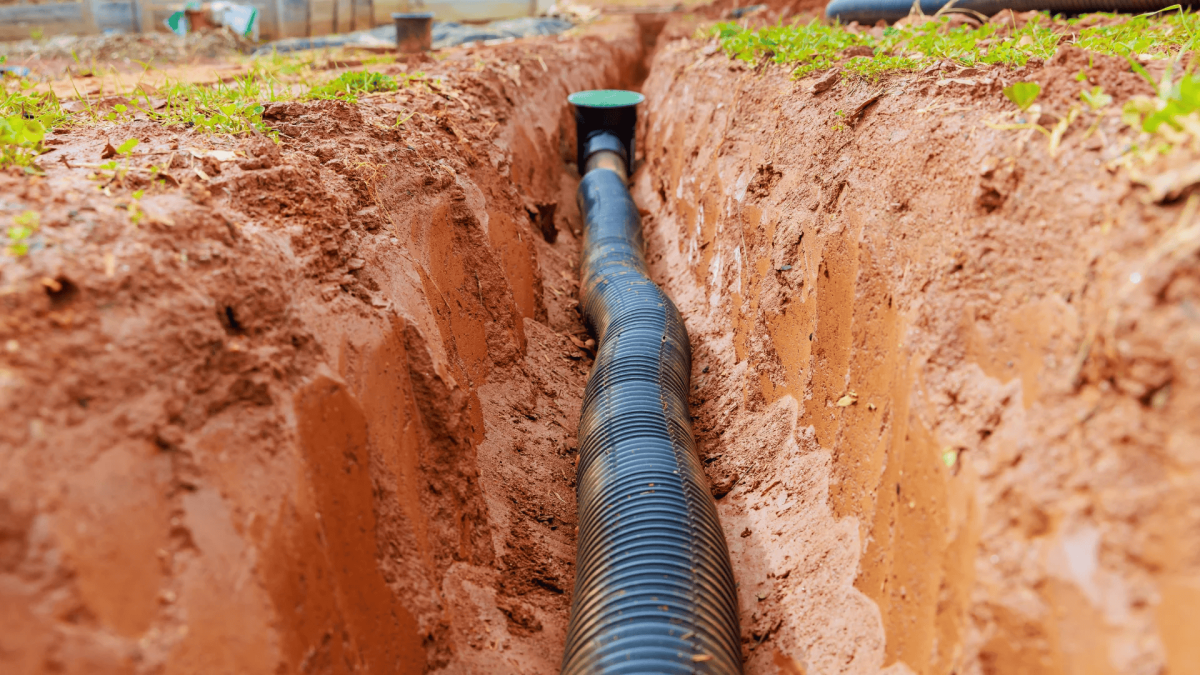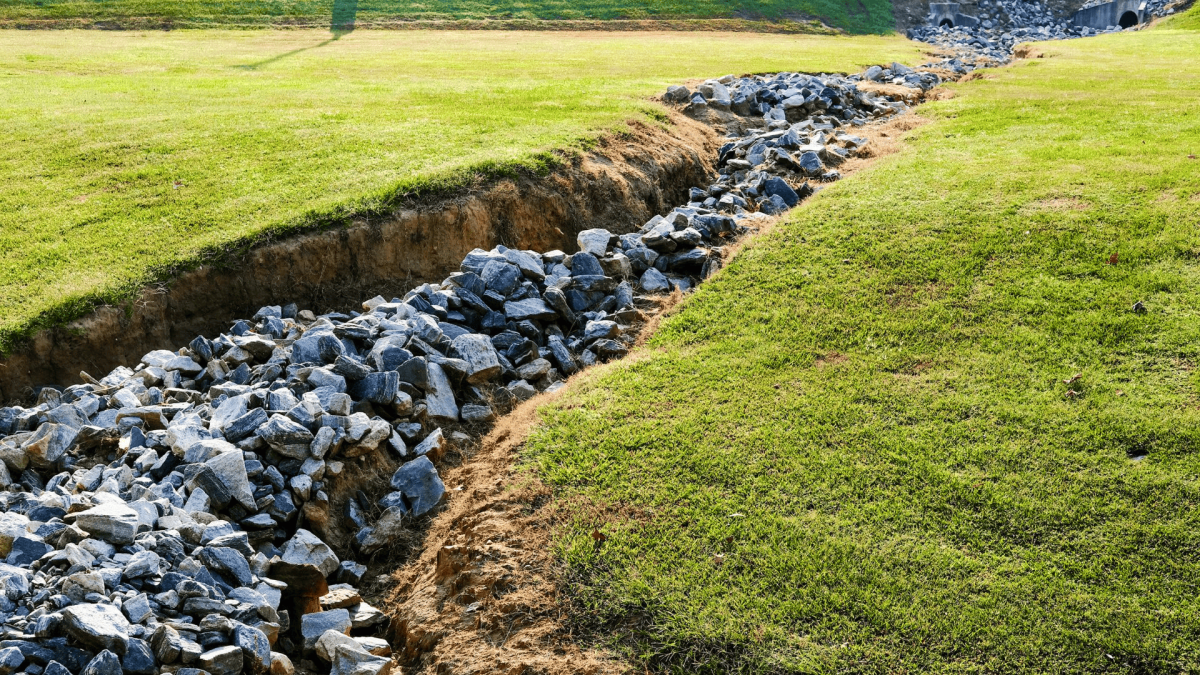Property owners throughout Tinton Falls and surrounding Monmouth County communities are increasingly recognizing that proper drainage represents one of the most critical aspects of landscape health and property protection. As seasonal precipitation patterns create water management challenges, landscape professionals are emphasizing the importance of comprehensive drainage assessment and professional solutions that prevent costly damage to foundations, hardscape installations, and landscape plantings.
The coastal proximity and soil composition characteristic of the Tinton Falls area create specific drainage considerations that differ from inland regions. Properties in Colts Neck, Eatontown, Ocean Township, and neighboring communities experience unique water flow patterns requiring professional evaluation and tailored solutions rather than generic approaches.
Homeowners are learning that addressing drainage issues prevents problems far more cost-effectively than repairing damage after water infiltration compromises foundations, undermines paver patios, or creates persistent moisture problems affecting both structures and landscapes.
Understanding Regional Drainage Challenges
The Monmouth County area presents specific characteristics affecting how water moves across properties. Soil composition varies significantly even within small geographic areas, with some properties featuring heavy clay content that prevents efficient water absorption while others have sandy soils that drain quickly but may not provide adequate moisture retention for plantings.
Seasonal precipitation patterns compound these challenges. Heavy spring rains, summer thunderstorms, and nor'easter events create substantial water volumes that properties must handle efficiently. Without proper grading and drainage systems, this water collects in low spots, flows toward foundations, pools on paver surfaces, or creates erosion channels that gradually reshape landscapes in undesirable ways.
Many properties in established neighborhoods were graded decades ago using standards and techniques that don't reflect current understanding of optimal water management. Over time, soil settlement, landscape changes, and modifications to neighboring properties alter drainage patterns. What functioned adequately when homes were built may no longer provide sufficient water management as conditions evolve.
The consequences of inadequate drainage extend beyond temporary puddles or muddy areas. Water finding paths toward foundations can compromise structural integrity, create basement moisture problems, and damage foundation waterproofing. Pooling water on paver patios and driveways accelerates deterioration through freeze-thaw cycles during winter months. Persistent moisture in planting beds creates conditions favoring fungal diseases and root rot while preventing healthy plant establishment.
Comprehensive Drainage Assessment Process
Effective drainage solutions begin with thorough property assessment identifying how water currently moves across the landscape and where problems exist or may develop. Professional evaluation considers multiple factors beyond simply observing where puddles form after rainstorms.
Site topography analysis examines the overall slope and grade of properties, identifying high points where water originates and low points where it accumulates. This analysis extends beyond individual properties to consider how water from neighboring lots affects drainage patterns. Understanding the complete picture allows for designing solutions that manage water throughout its entire path across the property.
Soil composition testing reveals how quickly different areas absorb moisture and whether soil amendments might improve drainage capacity in specific locations. Clay-heavy soils benefit from different solutions than sandy soils, and professional assessment identifies these variations across properties.
Existing drainage infrastructure requires evaluation to determine whether current systems function properly or need upgrading. Many properties have outdated or inadequate systems that were minimally sufficient when installed but don't handle current conditions effectively. Gutters, downspouts, and perimeter drains all play roles in overall water management and need assessment as part of comprehensive evaluation.
Hardscape installations create impermeable surfaces that concentrate water flow rather than allowing gradual absorption. Properties with extensive paver patios, walkways, or driveways need drainage solutions accounting for this increased runoff. The relationship between hardscape features and drainage systems requires careful consideration during both initial installation and ongoing property management.
French Drain Systems and Strategic Water Management
French drains represent one of the most effective solutions for properties experiencing persistent drainage problems. These systems collect and redirect water away from vulnerable areas, preventing accumulation that causes damage or creates unusable spaces.
A properly designed French drain system involves more than simply digging trenches and installing perforated pipe. Professional installation requires understanding where water needs collection, determining optimal routing for redirecting flow, calculating appropriate depth and slope for efficient function, and selecting materials that provide long-term reliability without clogging or degradation.
The placement of French drains relative to foundations, hardscape features, and planting areas requires expertise ensuring these systems protect vulnerable elements while integrating seamlessly into overall landscape design. Visible portions should appear intentional rather than like afterthought repairs, and systems should function reliably for decades without requiring frequent maintenance or replacement.
French drain effectiveness depends significantly on proper installation technique. Inadequate slope prevents efficient water movement. Insufficient gravel surrounding pipes reduces collection capacity. Poor connection to discharge points allows water to resurface in undesirable locations. Professional installation addresses these factors systematically, creating systems that perform reliably under varying precipitation conditions.
Grading Solutions for Long-Term Water Management
Proper grading represents the foundation of effective drainage, literally shaping how water moves across properties. Professional grading work creates subtle slopes directing water away from structures and vulnerable areas while maintaining aesthetically pleasing landscapes that don't appear artificially sculpted.
Grading projects range from minor adjustments correcting specific problem areas to comprehensive reworking of entire properties. The scope depends on existing conditions, the severity of drainage issues, and whether work coordinates with other landscape improvements. Properties undergoing paver patio installation, retaining wall construction, or complete landscape renovations benefit from addressing grading comprehensively rather than as isolated corrections.
The relationship between grading and other landscape elements requires careful coordination. Planting beds need appropriate drainage preventing standing water while retaining adequate moisture. Lawn areas should shed water efficiently without creating channels or bare spots. Transitions between different grades should appear natural and integrate smoothly with existing topography.
Professional excavation and grading services involve precision work using appropriate equipment to achieve specified slopes and transitions. This work requires understanding soil characteristics, compaction requirements, and how finished grades will perform under various weather conditions. Experienced contractors anticipate settlement, account for seasonal changes, and create grading that maintains effectiveness over time.
Drainage Gardens as Functional Landscape Features
Properties requiring significant water management sometimes benefit from drainage gardens that serve dual purposes as both functional water collection areas and attractive landscape features. These specialized planting areas occupy naturally low spots or strategically located collection points, featuring plant varieties tolerant of periodic saturation while thriving during drier periods.
Drainage gardens transform potential problem areas into landscape assets. Rather than fighting against natural water flow patterns, these features work with existing topography while providing visual interest through carefully selected plantings. The approach offers particular advantages for properties where conventional drainage systems alone don't fully address water management needs or where environmental considerations favor natural filtration approaches.
Design and installation of effective drainage gardens requires understanding both horticultural requirements and hydrological function. Plant selection must account for varying moisture conditions, root system characteristics that aid drainage, and aesthetic qualities that enhance overall landscape appeal. Proper soil amendments and strategic grading ensure these features function as intended while establishing successfully and requiring reasonable maintenance.
Professional Expertise and Local Knowledge
Effective drainage solutions require more than general landscaping knowledge. Understanding local soil conditions, typical precipitation patterns, and regional best practices comes from years of experience working specifically in the Tinton Falls area and surrounding Monmouth County communities. Artistic Landscape Features brings this specialized expertise to drainage challenges, having addressed diverse property conditions throughout the region since 2012.
This experience translates to recognizing problems quickly, designing appropriate solutions efficiently, and implementing work that performs reliably for decades. Professional teams understand which approaches work best for specific soil types, how to coordinate drainage work with other landscape improvements, and how to create systems that enhance rather than detract from property aesthetics.
Addressing Drainage Before Problems Escalate
Water damage accumulates gradually in many cases, with minor issues slowly developing into significant problems requiring expensive repairs. Addressing drainage concerns proactively prevents this escalation, protecting property values and eliminating stress associated with basement flooding, foundation issues, or landscape deterioration.
For homeowners throughout Tinton Falls, Colts Neck, Eatontown, and surrounding communities concerned about drainage performance on their properties, Artistic Landscape Features provides comprehensive assessment and professional solutions. Call 609-798-2364 to schedule a drainage evaluation and protect your property investment through proper water management.





